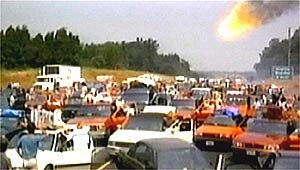US General: Hitting a small object from space could be mistaken for dropping a nuclear bomb; In June, a small asteroid exploded over the Mediterranean Sea with the force of the Hiroshima bomb; NASA prefers to focus on the large objects
https://www.hayadan.org.il/astroid071002.html
Voila system!

An asteroid hits the Earth in a motion picture. The reality will be no less difficult
While astronomers focus on the search for large asteroids that pose a threat to Earth, much smaller space rocks could ignite a nuclear war in the world - military and space agency officials told a committee in the US Congress. It was announced in CNN that scientists estimate that more than 1,000 asteroids with a diameter of a kilometer are close to an impact path on the Earth and could cause a disaster of huge proportions if their impact is accurate.
General Simon Worden of the US Air Force said that collisions with such rocks occur once in a million years, but space rocks the size of an average car hit a ball about once a week. According to him, whale-sized rocks hit the Earth once every few decades.
The general told the Congressional Committee on Science that an asteroid five to ten meters in diameter exploded in June over the Mediterranean Sea and released energy as powerful as the atomic bomb dropped on Hiroshima, Japan.
"Imagine that a strong flash accompanied by a shock wave occurs over India or Pakistan," Worden said. He explained that such a scenario could ignite a nuclear war between the countries due to a mistake in identifying the source of the explosion.
The general explained to members of Congress that an asteroid with a diameter of 100 meters hitting a large city could cause thousands of deaths. The general and other experts spoke before the committee that should decide whether to continue funding the small asteroid counting study conducted by the space agency NASA. The space agency claimed that the expansion of the project is not necessary at this stage. Joseph Burns of Cornell University suggested that NASA help fund a $125 million observatory to track smaller objects.
https://www.hayadan.org.il/BuildaGate4/general2/data_card.php?Cat=~~~339687079~~~35&SiteName=hayadan
